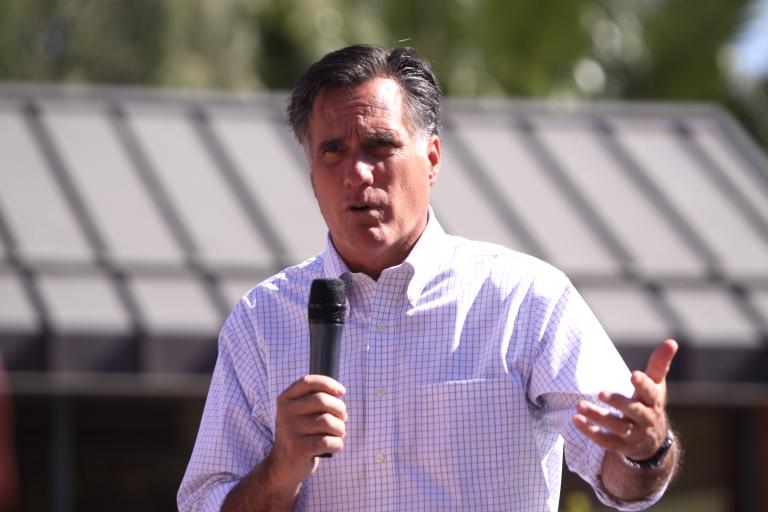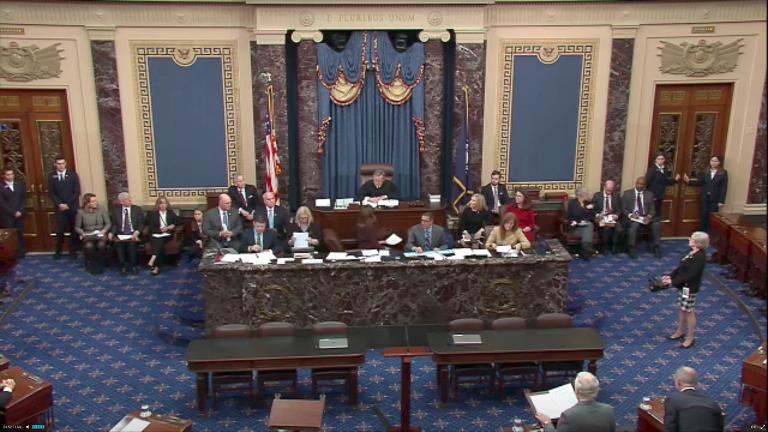
The most important moment of Senator Mitt Romney’s speech yesterday was when he wasn’t actually speaking. That moment arrived near the beginning of his remarks, when he talked about his faith. “As a senator-juror, I swore an oath before God to exercise impartial justice,” he said. “I am profoundly religious. My faith is at the heart of who I am.” And what followed next was silence. It lasted twelve long seconds. During these twelve seconds, the cameras didn’t offer a view of his face, but it was clear from his body language that he was struggling to find his composure. He stared down at his notes. He bit his lip several times. He took deep breaths. The microphone picked up the sound of a hard swallow, and one wondered if he was fighting back tears.
When at last he resumed speaking, he returned to the matter of the obligations of his faith. “I take an oath before God as enormously consequential,” he said. “I knew from the outset that being tasked with judging the president, the leader of my own party, would be the most difficult decision I have ever faced. I was not wrong.” Romney proceeded to explain how his vote to convict President Trump of abuse of power arose from his deep religious convictions:
But my promise before God to apply impartial justice required that I put my personal feelings and political biases aside. Were I to ignore the evidence that has been presented and disregard what I believe my oath and the Constitution demands of me for the sake of a partisan end, it would, I fear, expose my character to history’s rebuke and the censure of my own conscience. I’m aware that there are people in my own party and in my state who will strenuously disapprove of my decision, and in some quarters I will be vehemently denounced. I’m sure to hear abuse from the president and his supporters. Does anyone seriously believe that I would consent to these consequences other than from an inescapable conviction that my oath before God demanded it of me?
The news media has since paid great attention to Romney’s remarks, often printing them in full, and for good reason. There is much to analyze in the words spoken by the sole Republican who chose to buck his own party and vote to remove President Trump from office. But while Romney’s speech was important, it was actually the twelve seconds of non-speech—his long, heavy silence–that most powerfully communicated the intensity of his emotions, the depth of his faith, and the religious grounding for his decision.
Listening to silence
In a world saturated with words—often, it seems, an overabundance of words—it’s easy to overlook silence. We tend to think about silence in terms of absence rather than as something meaningful and substantive in itself. Moreover, in a digital era of hashtags, tweets, and memes, silence isn’t easily quotable, and it resists the rapid circulation that has so much cultural currency today.
Yet silence is important, and sometimes silence says much more than words. I know this from my own experience as an oral historian. I’m trained to listen to both words and silence, and I know that understanding people’s stories requires paying attention to when the people I interview speak, but also when they stop. When they take a deep breath. When they bite their lip. When they fight back tears. When their emotions are so heavy that it finds expression in only the small sound of a hard swallow.
Many oral historians have written about the importance of paying attention to silence. Alexander Freund argued, for example, that they are “a constitutive part of oral history interviews.” They can carry a wide variety of meanings, and it is one of the scholar’s greatest challenges to interpret these silences, which, among other things, can be a means of evading and forgetting, but also reflecting or showing concern for self or others. In addition, silence is a way that people express intense feelings. The film scholar and oral historian Dalrún J. Eygerðardóttir found, for example, that silence was the primary means for the people she interviewed to articulate deep sorrow.
Silence can also have religious significance. As the religion scholar Brett Esaki argues in his book, Enfolding Silence, “silence itself can be sacred,” and some silence–in particular, the emotional silence that he describes as “non-binary”—is a “higher-order silence,” one that “exudes more energy than the sum of its silences.” Esaki writes that “such sacred silence can be used for spiritual purposes, such as healing, wisdom, and the strength to survive.”
How, then, should we make sense of Mitt Romney’s silence? Most obviously, his silence communicated the intense emotion he felt in the moment. His colleague Senator Lisa Murkowski described Trump’s impeachment as “trying, difficult, and painful,” and Romney appeared to share similar feelings of anguish. The twelve seconds of silence, on one level, conveyed sadness and grief.
More importantly, Romney’s silence reveals the deep religious commitment that guided his decision. This interpretation might seem strange because we typically associate intense religiosity with noise—an exuberant “Hallelujah!”, an emphatic “Amen,” a plaintive hymn, a passionate prayer. We think of praise bands and street preachers and politicians quoting from the Bible.
Romney offered none of this noisy religious piety. As he detailed the reasoning behind his decision, he delivered his carefully prepared remarks in a measured, deliberate manner, absent the bluster and bombast we so often hear in Congress.
Most of all, there were meaningful silences, which did more to express the significance of his religious commitments than any of the words he uttered. At first, the silences were subtle. For example, when Romney stated that he “swore an oath before God,” he set apart the words “before God” with short pauses that emphasized the sanctity of his promise.
And then there was the eloquence of the emotional, twelve-second silence, which appeared to take Romney himself by surprise. What caused this man—a senator and a former governor and presidential candidate known for his poise and polish—to become so unsettled? The sentences preceding his long silence—when he identified himself as a religious man and declared that his faith is at the core of his identity—offers important context for interpretation. As Romney took deep breaths and struggled to find his composure, these long twelve seconds appeared to be a moment when he truly understood—not just intellectually, but in his very body—the weight of his sacred oath, the responsibility of his religious convictions, and the higher authority to which he believes he must ultimately answer.
Chief Justice John Roberts presides over the impeachment trial of Donald Trump, January 16, 2020 (Source: United States Senate, via Wikimedia Commons)
Taking Religion Seriously
Not surprisingly, Romney’s decision to vote for conviction has made him the target of criticism from all sides. Shortly after the vote, President Trump tweeted a video that accused Romney of being a “Democrat secret asset,” while Donald Trump, Jr. called for Romney’s expulsion from the Republican party. Meanwhile, on the left, critics argued that Romney wasn’t acting with any special moral courage—voting to convict was what any decent person would do, they argued–and many pointed out that Romney, as a recently elected senator with several more years in his term, had little to lose.
Underlying many of these criticisms of Romney is the assumption that he voted to convict out of shrewd political calculation rather than religious belief or moral principle. Although Romney’s words and silences emphasized the centrality of his religious faith in his decision-making process, some observers remained skeptical—not simply of him, but of the idea that religion could actually be something that genuinely shapes people’s choices.
This suspicion of religion is not uncommon, as the religion scholar Kathryn Lofton recently argued in Modern American History. “Insofar as there is a prejudice,” she wrote, “it is about what religion is and how it—whatever it is—affects the lives of those who have it and speak of it.” She noted that political historians, much like observers of contemporary politics, tend to treat religion “as a problematic controlling influence” with a “covert political agenda.” Seeing religion as an epiphenomenal expression of political commitments, these scholars are unaware of their own biases and portray religion as “the rationale for mistaken political action” and “never a substantive practice.”
Decades from now, when American historians look back on this tumultuous week and analyze its long-term political consequences, they may very well view Romney’s decision to convict Trump as a “mistaken political action.” But if they truly consider Romney’s speech—not just by reading the text of his remarks, but by listening to it—they would find it hard to argue that religion is not a substantive practice. Through both his words—and most importantly, his silences—Romney revealed that his decision yesterday was not only political act, but also a profoundly religious one.














